ANIMALS
Surprised By A Big Pink Feather In Her Yard, The Woman Can’t Believe Who It Belongs To
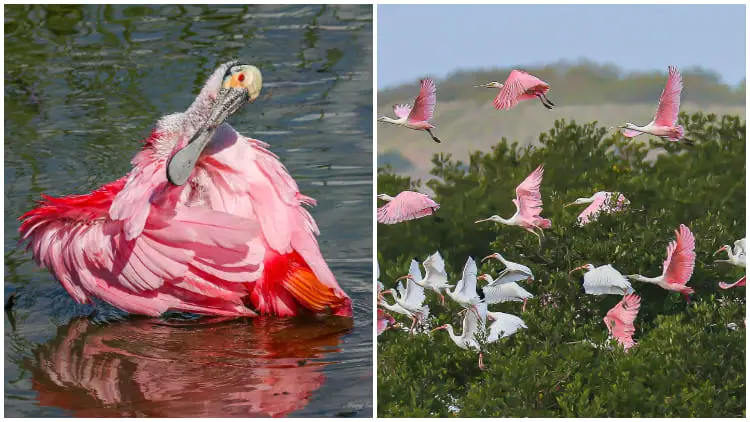
One day, while Mary Goldsmith was in her yard in Port Aransas, Texas, she was amazed to see a big pink feather gracefully descend from the sky. Having recently moved to the area, she was puzzled and wondered which bird could have possibly let it fall.
Curious and eager to find answers, she quickly went indoors to conduct some research. It was during this time that she stumbled upon information about a fascinating bird called the roseate spoonbill.
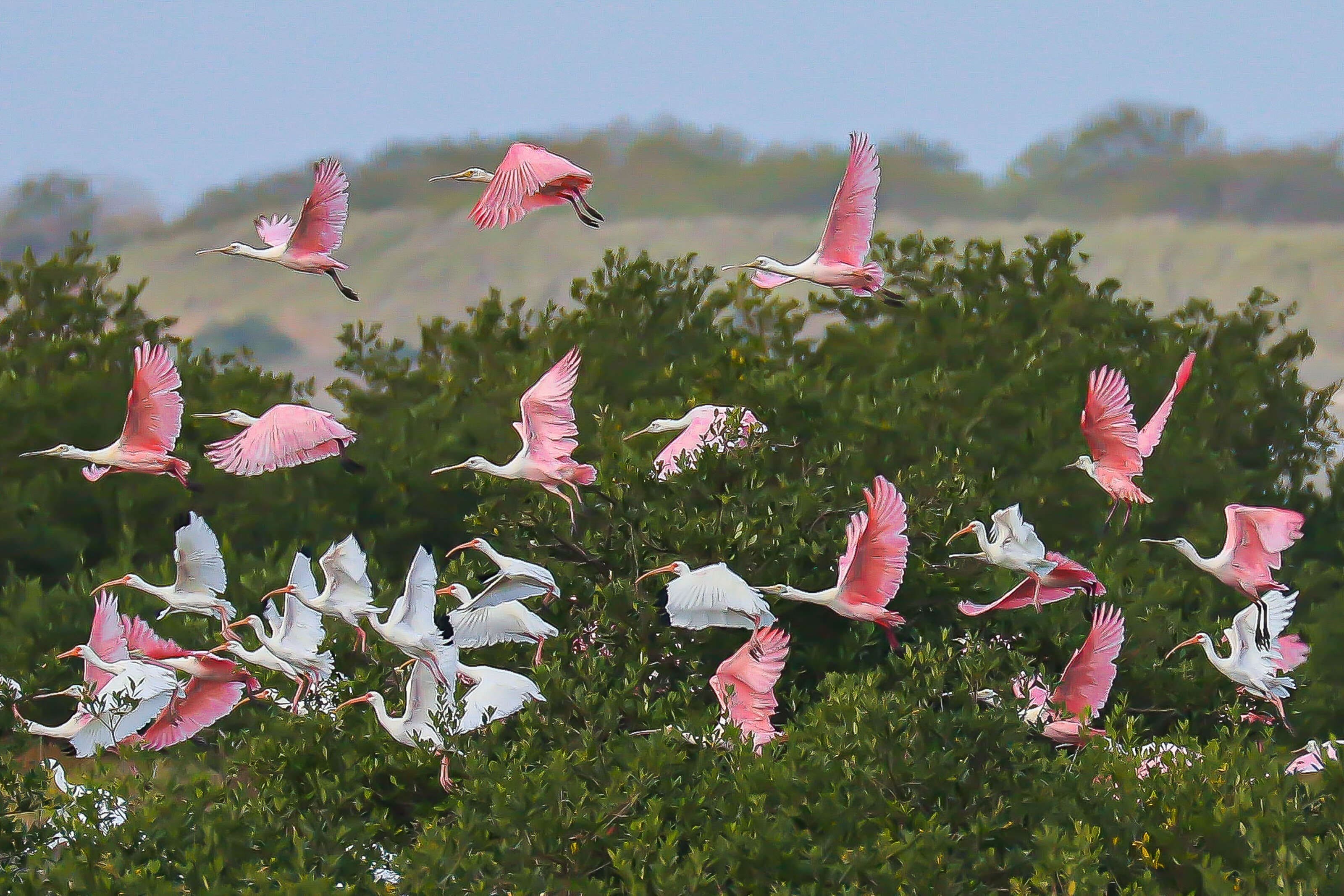 Image source: Mary Goldsmith Photography
Image source: Mary Goldsmith Photography
“I was in awe the first time I saw one in person,” Goldsmith told The Dodo. “Not only is it large and pink, but also has a green [spoon-shaped bill] which it swings back and forth in the water to trap food. It is a very unusual bird.”
Goldsmith has had the pleasure of witnessing these peculiar and stunning birds on numerous occasions, particularly since they hold the esteemed title of being the official bird of Port Aransas. She believed she had seen all there was to see until one day, during a visit to the Leonabelle Turnbull Birding Center, she encountered a remarkable sight that left her utterly astonished once more.
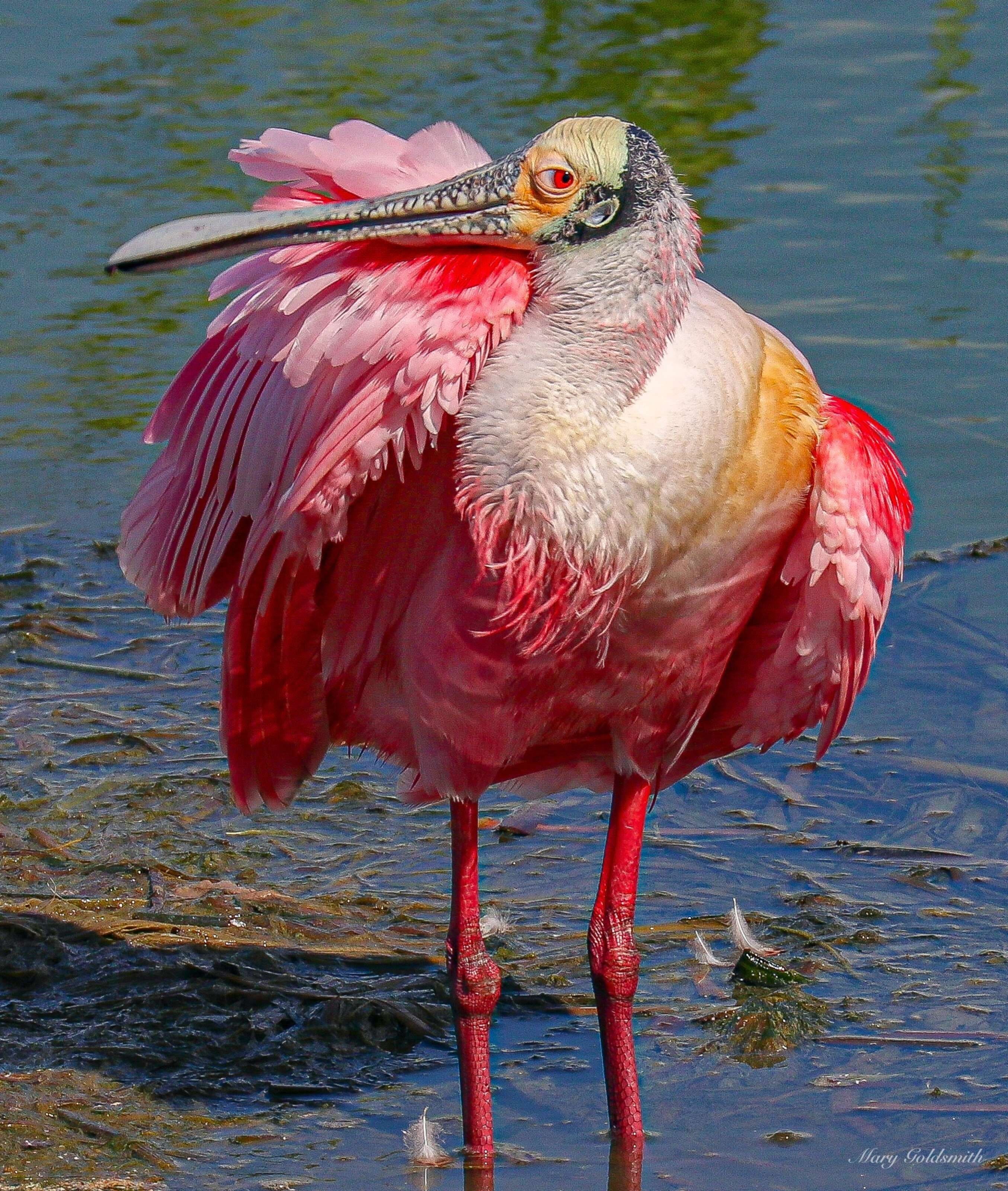 Image source: Mary Goldsmith Photography
Image source: Mary Goldsmith Photography
“This particular bird was one of the most vibrant I have seen,” Goldsmith said. “During the breeding season, the roseate spoonbill’s feathers become a deeper pink with accents of orange and yellow. This bird was on fire with breeding colors!”
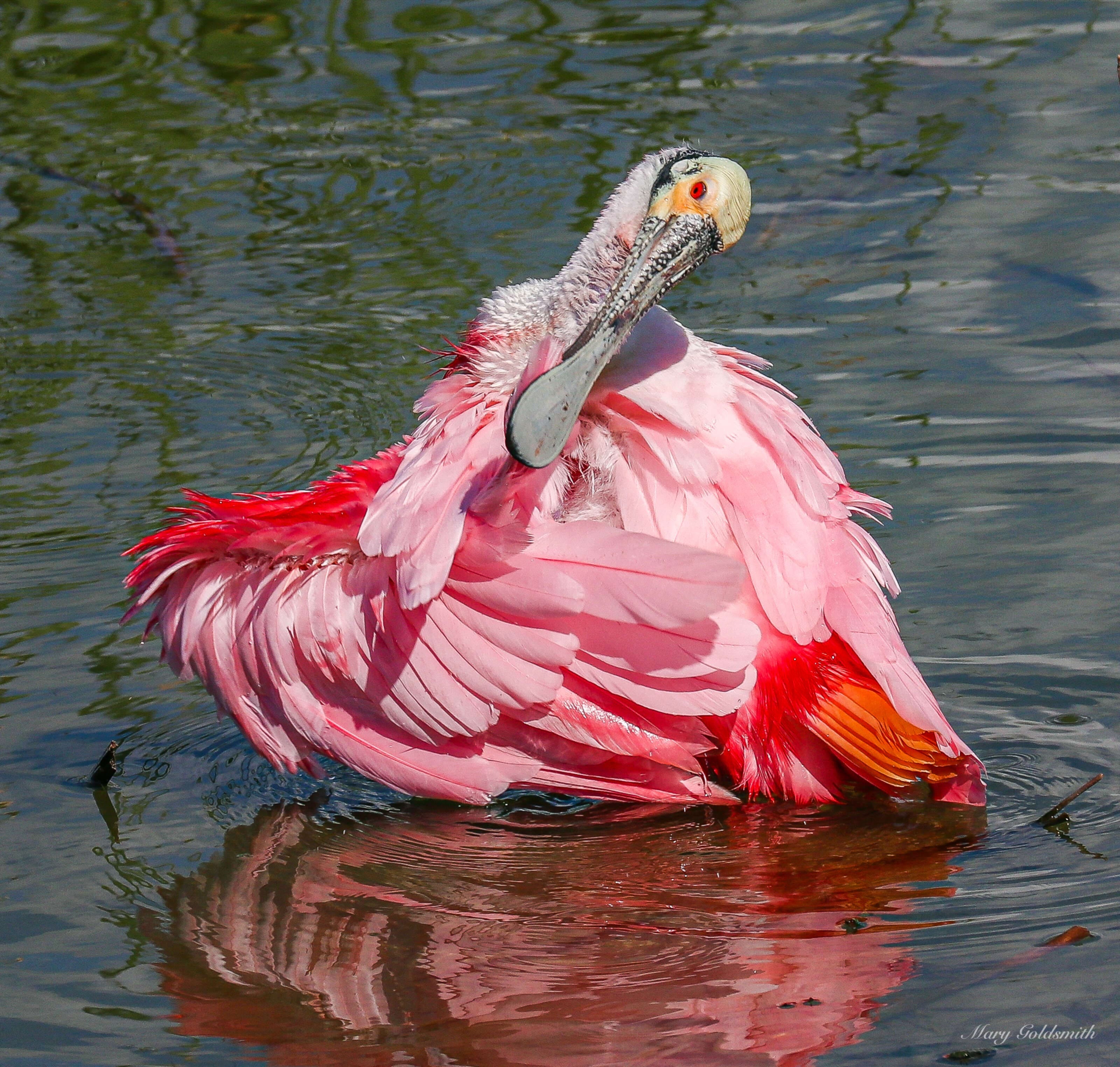 Image source: Mary Goldsmith Photography
Image source: Mary Goldsmith Photography
Goldsmith observed the bird intently and soon realized that the bird was observing her just as attentively.
“It stood right in front of me going through different poses and seemed to respond to the click of the camera,” Goldsmith said.
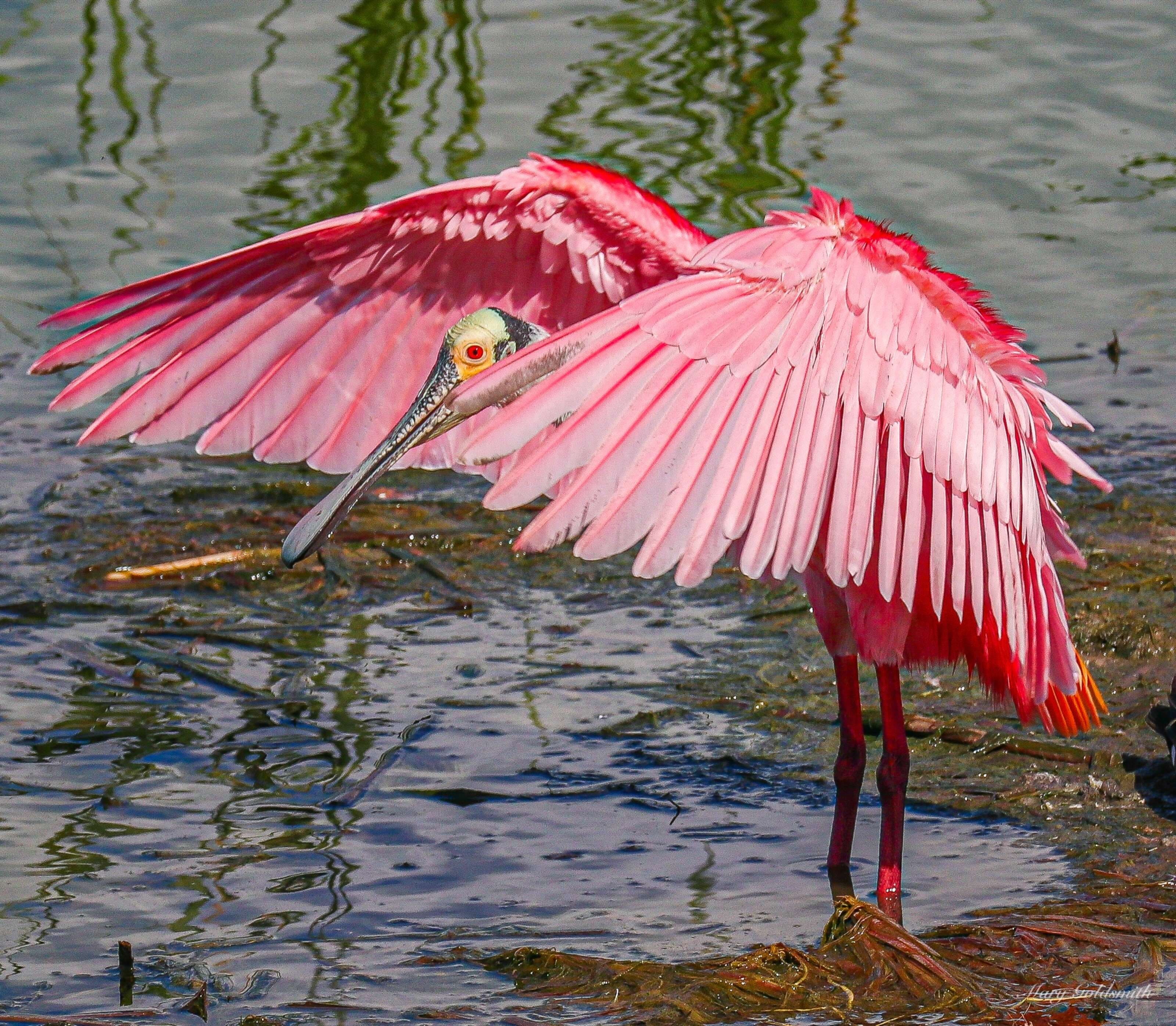 Image source: Mary Goldsmith Photography
Image source: Mary Goldsmith Photography
The bird appeared to be aware of its own beauty and enjoyed posing in various positions. Being a photographer, Goldsmith appreciated the bird’s cooperation and playfully reciprocated it by capturing its charming poses.
Even though Goldsmith regularly spotted roseate spoonbills, this one, in particular, left her in awe, and she eagerly anticipates discovering more surprises that these birds have in store for her.
ANIMALS
Amazing Video of Unseen Ocean Creatures in the Ningaloo Canyons

The Schmidt Ocean Institute recently explored the Ningaloo Canyons on the western coast of Australia using a robotic underwater vehicle called the ROV Sebastian. Check out the amazing video of what they discovered in the deep parts of the Indian Ocean.
More info: Youtube




ANIMALS
These Pics Are Art and the Artists Are Insects

Flying insects move so quickly that they are hard to follow, but new technology and some smart ideas have helped Spanish photographer Xavi Bou do just that. After spending 10 years focusing on birds in flight for his Ornithographies project, he turned his attention to insects.
For Entomographies, he uses high-speed video footage taken by Adrian Smith, an insect expert at North Carolina State University, to study and record how insects move. Bou then picks multiple frames and combines them into single images that show the fast movements of one or more insects through space and time.
With Smith’s help, Bou has captured the aerial tricks of wasps, the jumps of leafhoppers, and the fluttering of butterflies in amazing detail. He hopes that by doing this, he can make people more aware of the decline in important insect populations around the world.
1. Zebra longwing
This butterfly, which is common in many areas of the Americas, really fits its name. It can fly very high with just a few flaps of its large wings.
 Image source: nationalgeographic
Image source: nationalgeographic
2. Two-lined spittlebug
This insect, which comes from the eastern United States, is often seen as a pest because it likes to eat grass. Its springy back legs can make it jump into the air like a rocket.
 Image source: nationalgeographic
Image source: nationalgeographic
3. Yellow-collared scape moth
Unlike most moths, this North American species flies during the day. Its shiny blue-black wings sparkle in the sunlight.
 Image source: nationalgeographic
Image source: nationalgeographic
4. Ailanthus webworm moths
These tropical moths have spread farther north in the U.S. Because of their larval host, the invasive tree of heaven, they are now one of the most common backyard moths in the country.
 Image source: nationalgeographic
Image source: nationalgeographic
5. Common stonefly
Mostly found in eastern North America, this insect starts its life as an underwater nymph in forested streams or rivers. Then it leaves the water, sheds its skin, and becomes an adult with wings.
 Image source: nationalgeographic
Image source: nationalgeographic
6. Green lacewings
Eighty-seven species of this insect have been found in the U.S. and Canada. Since they eat a lot of unwanted plant pests like aphids and mites, they are often used to naturally control these pests.
 Image source: nationalgeographic
Image source: nationalgeographic
7. Grapevine beetle
This insect, fittingly named, eats the leaves and fruit of grapevines, both wild and farmed, but it doesn’t do much damage to the plants. As a type of scarab beetle, it often flies in a curved path.
 Image source: nationalgeographic
Image source: nationalgeographic
8. Oak treehopper and green treehopper
Treehoppers are known for their uniquely shaped pronotum, the part behind their head, which often looks like plant parts to hide from predators. They can jump well thanks to special muscles.
 Image source: nationalgeographic
Image source: nationalgeographic
9. Banded orange
This brightly colored butterfly can be found from Mexico to Brazil. Before mating season, male butterflies look for mineral salts, sometimes even drinking salty fluids from the skin, eyes, and nostrils of other animals.
 Image source: nationalgeographic
Image source: nationalgeographic
10. Sapho longwing
Longwings can live for 6 to 7 months, longer than most butterflies. This type, found from Mexico to Ecuador, has shiny blue wings, which is why it’s also called the Sapphire longwing.
 Image source: nationalgeographic
Image source: nationalgeographic
ANIMALS
Eagle and Fox in an Epic Midair Battle Over a Rabbit, Were Captured by a Photographer

Wildlife photography often depends on the perfect combination of good timing and the right place.
That’s exactly what happened when Kevin Ebi, an experienced wildlife photographer, captured an incredible battle between a bald eagle and a red fox, both competing for a rabbit meal.
In a detailed blog post, Ebi shares the fascinating series of events that unfolded while he was photographing foxes in San Juan Island National Historical Park, located in Washington state.
Ebi noticed a lively group of eight fox kits as they began their hunting lessons. Suddenly, they spotted a rabbit, and a thrilling chase ensued. Eventually, one of the foxes emerged as the winner, proudly carrying the rabbit across the field.
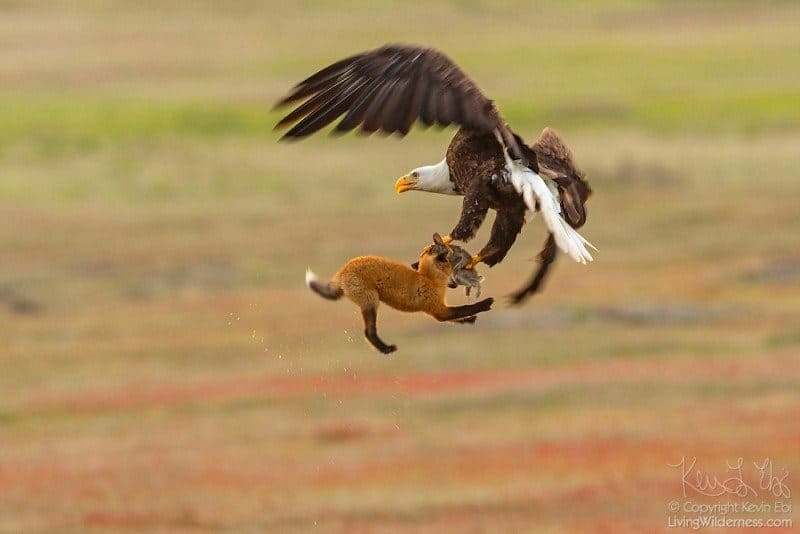 Image source: Kevin Ebi
Image source: Kevin Ebi
Ebi shares what happened at that moment: “As I followed the fox with my camera, a sudden bald eagle cry caught my attention. It was swiftly approaching, clearly aiming for the rabbit. I quickly focused on the fox, anticipating a quick turnover of events.”
To Ebi’s astonishment, instead of a quick surrender, the situation turned into a intense fight in the air.
The eagle used its power to lift the fox and rabbit high up in the sky. Even while airborne, the fox attempted to break free by swinging back and forth.
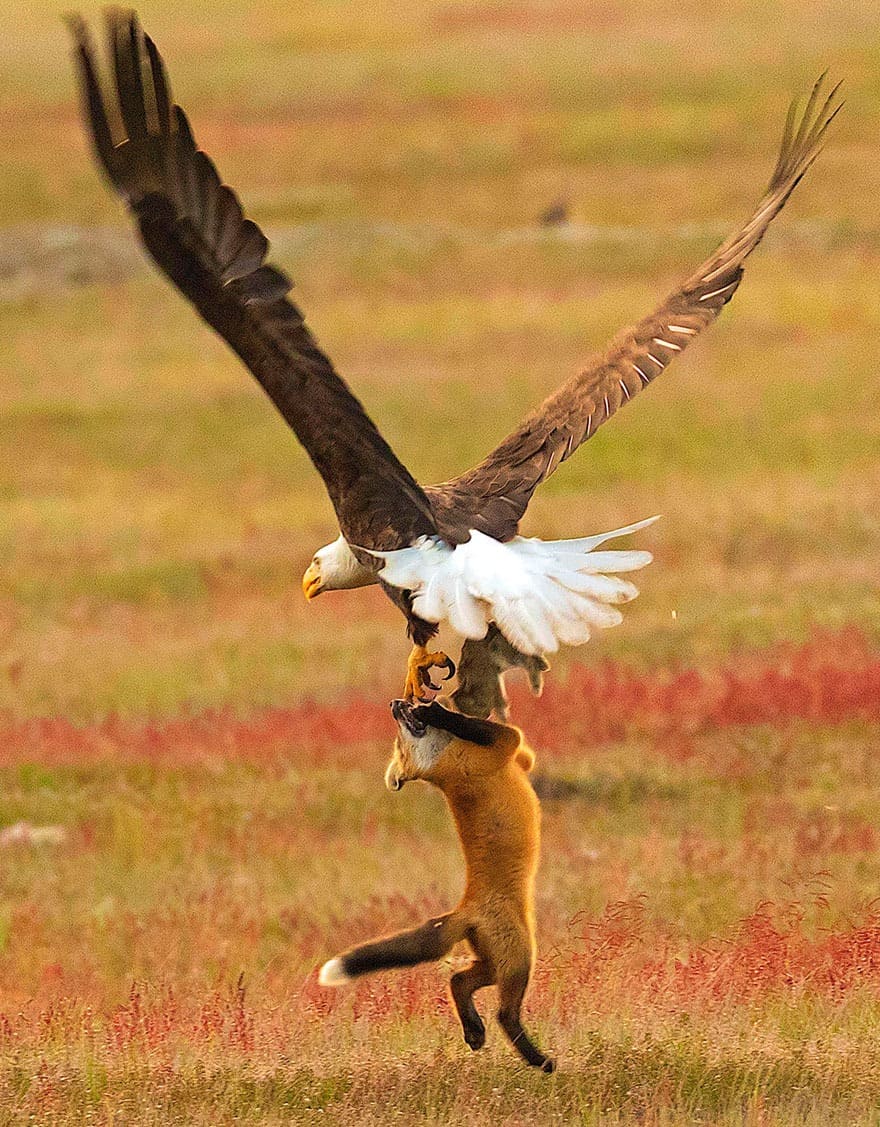 Image source: Kevin Ebi
Image source: Kevin Ebi
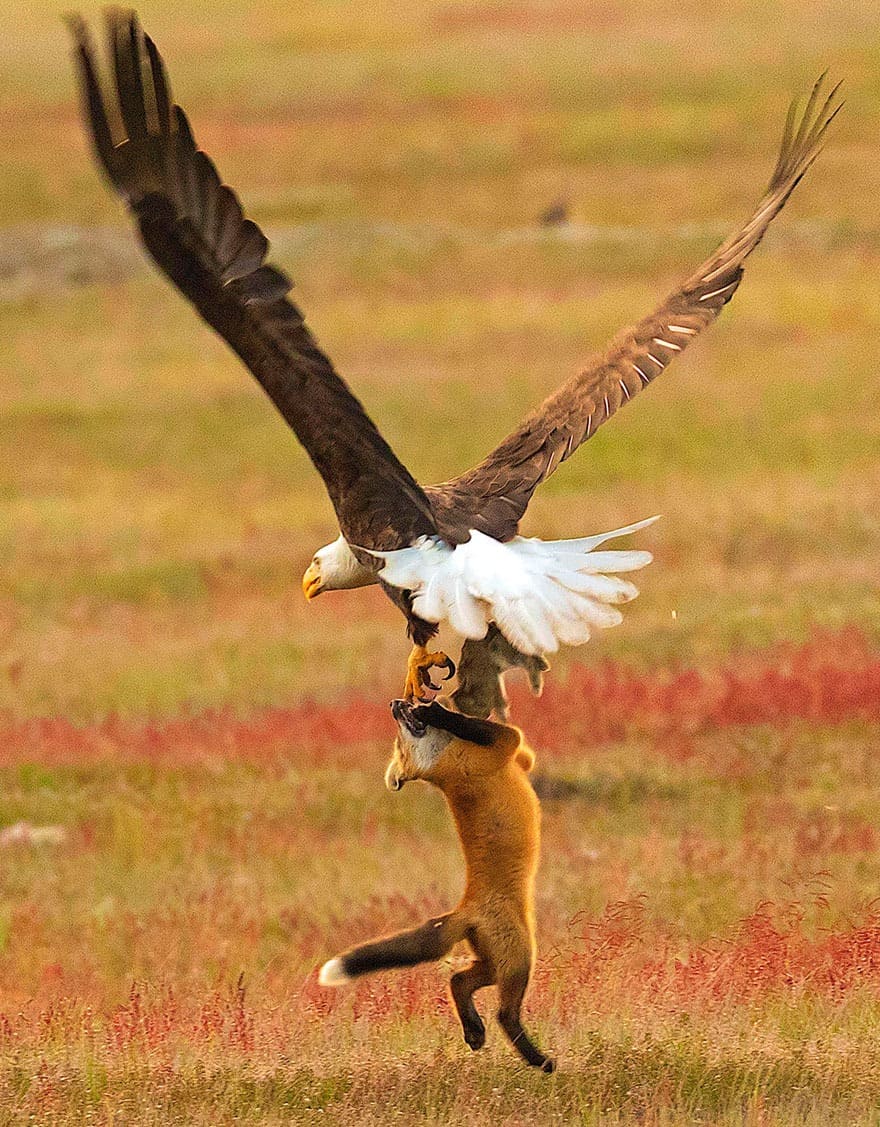 Image source: Kevin Ebi
Image source: Kevin Ebi
 Image source: Kevin Ebi
Image source: Kevin Ebi
In the end, the eagle moved the rabbit to its other claw, causing the fox to let go. The intense battle came to an end in less than 10 seconds.
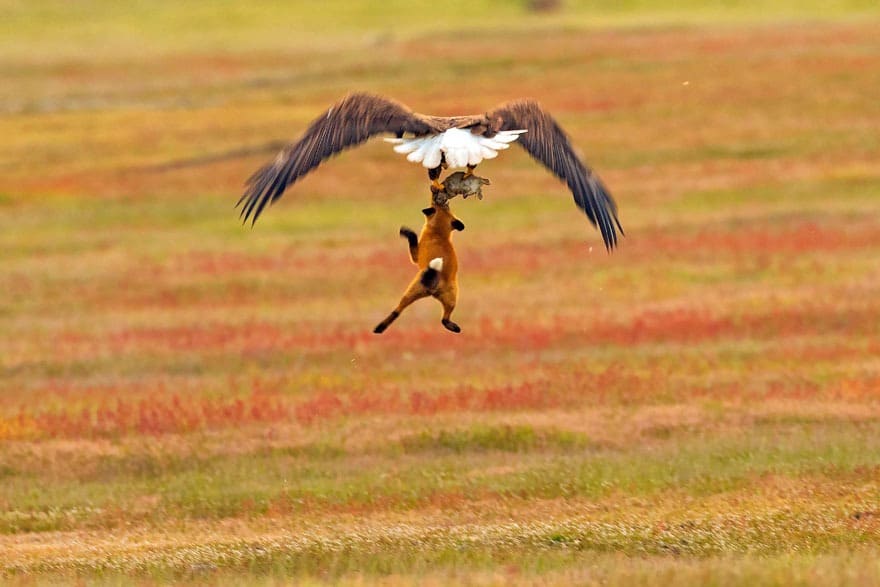 Image source: Kevin Ebi
Image source: Kevin Ebi
For those worried about the fox’s well-being after the fight, Ebi reassures that it was not injured. The fox swiftly bounced back from the encounter and resumed its playful behavior with the other young foxes, showing no visible wounds from the aerial clash.
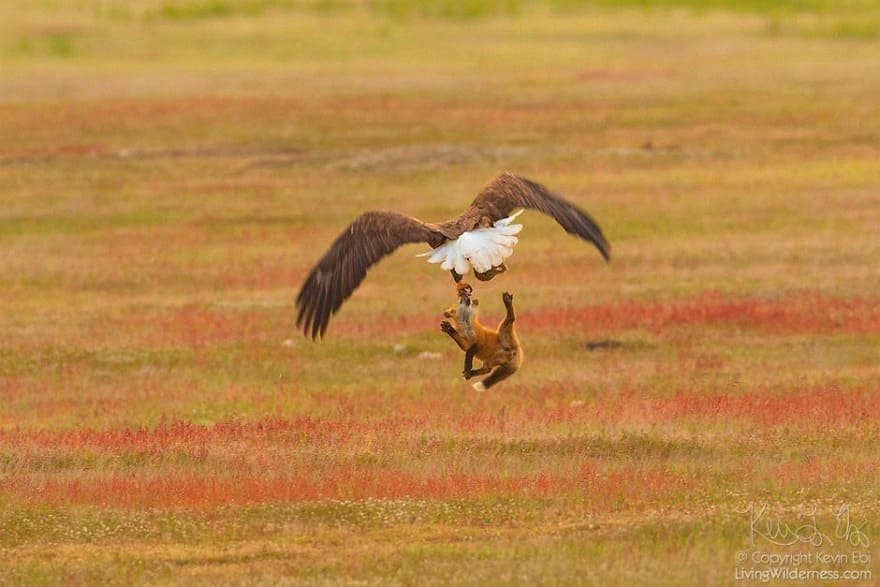 Image source: Kevin Ebi
Image source: Kevin Ebi
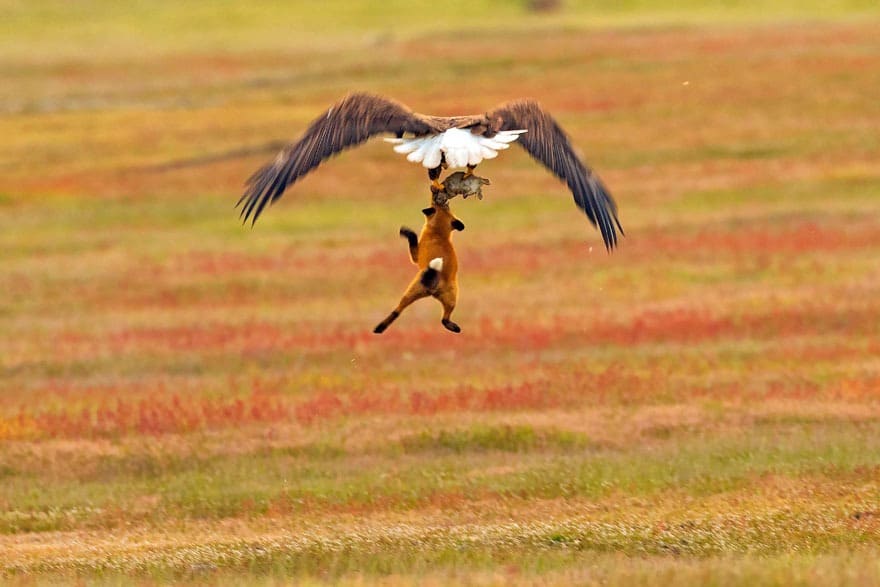 Image source: Kevin Ebi
Image source: Kevin Ebi
 Image source: Kevin Ebi
Image source: Kevin Ebi
 Image source: Kevin Ebi
Image source: Kevin Ebi
-

 GARDEN10 tháng ago
GARDEN10 tháng ago4 Easiest Ways to Get Free Plants
-

 ANIMALS10 tháng ago
ANIMALS10 tháng agoBritish Angler Caught Huge 67-Pound Goldfish in the World
-

 FUNNY10 tháng ago
FUNNY10 tháng ago30 Funny and Perplexing Photos That Make You Laugh All Day
-

 GARDEN9 tháng ago
GARDEN9 tháng ago30 Shimmering Side Yard Landscape Ideas
-

 FUNNY10 tháng ago
FUNNY10 tháng ago30 Weirdest Things That People Came Across On The Subway
-

 DIY & CRAFT10 tháng ago
DIY & CRAFT10 tháng ago19 Easy and Creative DIY Ideas to Enhance Front Yard
-

 ANIMALS10 tháng ago
ANIMALS10 tháng agoKindhearted Driver Rescues Skinny Dog Hiding Near Highway Thanks to His Eagle Eye
-

 FUNNY10 tháng ago
FUNNY10 tháng ago22 Design Fails That Will Make You Laugh Out Loud





